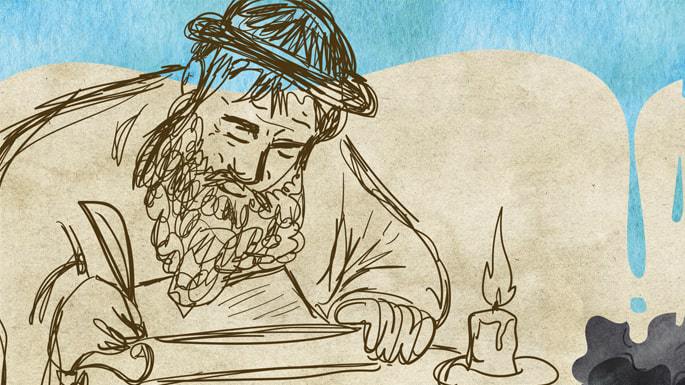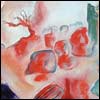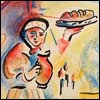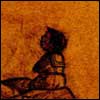Rabbi Akiva was one of the most prolific and inspiring teachers of Judaism, who formed a crucial link in the chain of transmission of Jewish tradition that began with Moses and continues to this very day. He taught and led during the tumultuous years of the destruction of the Second Holy Temple, and was ultimately executed by the Romans for the “crime” of teaching Torah.
1. He Started as a Poor Shepherd
The descendant of converts to Judaism, Akiva began as a poor and ignorant shepherd tending the flocks of Kalba Savua, one of the wealthiest men in Jerusalem in the waning years of the Second Temple. He caught the attention of Rachel, daughter of his employer, who sensed that he had potential to become a great scholar. She agreed to marry him on the condition that he would study Torah.
2. His Father-in-Law Disowned Him
When Kalba Savua caught wind of Rachel’s choice, he swore that the young couple would not benefit from his wealth, and they started their home in a barn filled with straw and little else. At one time, Elijah the Prophet came by disguised as a pauper who begged them for some straw. “You see,” said Akiva to his wife, “there are some people who do not even have straw!”
Read: Elijah the Prophet
3. He Left Home for 24 Years
Despite their meager means, Rachel wholeheartedly encouraged Akiva to leave home for 24 years to study Torah in yeshivah at the feet of Rabbi Eliezer and Rabbi Yehoshua. He would later tell his students, “Mine and yours is all hers!”1
Read: What Is a Yeshivah?
4. A Water-Worn Rock Inspired Him at Age 40
Forty years old and entirely unlearned, Akiva observed how the water of a well had eroded a stone and arrived at the following conclusion: If the soft water can carve the hard stone, the solid words of Torah can surely penetrate my mind.
Read: A Drop of Water
5. He Was Not Ashamed to Study With His Son
Akiva started at the very beginning, learning the Hebrew alphabet alongside his son. In fact, they even shared a writing tablet. Intrigued and excited, he continued learning until he had mastered the entire Torah.2
6. Nothing Was Insignificant To Him
Rabbi Akiva’s approach to Torah study was extremely detail-oriented, and he extracted meaning from everything, even minor elements of the letters of the Torah. This was so impressive, the Talmud tells us, that Moses prophetically observed Rabbi Akiva in action and asked G‑d that the Torah be given through him instead.3
7. His Daughter Was Saved From a Snake
Astrologers told Rabbi Akiva that his daughter would die on her wedding day. When she went to bed after her wedding, she pushed her hair pin into the wall, as she often did. The following morning, she discovered that she had unknowingly pierced directly through the eye of a snake. After some prodding, she shared how she had given charity that morning; her good deed saved her from death.4
8. Two of His Sons Died Young
The Talmud tells that Rabbi Akiva lost two sons at the same time, and “all of Israel” came to comfort him. With his typical humility, Rabbi Akiva stood up and said that surely they had come to honor the Torah he studied and not him personally.5
9. He Was Bald
The sage Ben Azzai6 stated: “All the sages of Israel are to me like [insignificant] garlic peels, except for this bald one.” Accordingly, many identify Rabbi Yehoshua ben Korcha (“son of the bald”) as being one and the same as Rabbi Yehoshua, son of Rabbi Akiva.7
Interestingly, Elisha the Prophet was also famous bald—an attribute for which he was mocked.8
Read: Elijah and Elisha
10. He Saw Hope in the Destruction of Jerusalem
Rabbi Akiva lived through one of the most traumatic events in Jewish history—the destruction of Jerusalem and the burning of the Holy Temple at the hands of the Romans. Yet where others saw doom and despair, Rabbi Akiva saw hope and a brighter future up ahead.
Read: Rabbi Akiva’s Optimism
11. He “Entered Paradise”
The Talmud tells us a somewhat cryptic story of four sages who “entered the orchard (pardes)” — a euphemism for the esoteric tradition and spiritual awareness, and the source of the English word “Paradise.” While one died, another went insane, and the third became a heretic, only Rabbi Akiva “exited in peace.”9
12. His Teachings Are Dominant in Talmud and Midrash
The corpus of rabbinic traditions of the post-Temple era are recorded in several Talmudic and Midrashic texts. All of them are based on the teachings of Rabbi Akiva, interpreted and recorded by his students. In the words of the Talmud:
An unattributed Mishnah is the teaching of Rabbi Meir. Unattributed Tosefta is by Rabbi Nechemia. An unattributed Sifra is from Rabbi Yehuda. An unattributed Sifri is by Rabbi Shimon. And all of them follow Rabbi Akiva.10
13. He Promoted Love and Respect
Reflecting on the verse “And you shall love your fellow like yourself,”11 Rabbi Akiva famously taught:
This is [the] great principle of the Torah, so you shall not say, ‘Since I was disrespected, let my fellow be disrespected along with me,’ or ‘Since I was cursed, let my fellow be cursed along with me.’12
14. He Gained (and Lost) 24,000 Students
Every year between Passover and Shavuot the Jewish nation mourns the tragic loss of Rabbi Akiva’s 24,000 students, who passed away during this period.
According to the Talmud:
Rabbi Akiva had 12,000 pairs of disciples from Gabbatha to Antipatris; all of them died at the same time, because they did not treat each other with respect.
This is astonishing when one considers that they were students of the rabbi who taught that respecting others is the central pillar of Judaism.
15. He Rebuilt From Scratch
Even after suffering such a crushing blow, Rabbi Akiva soldiered on. As the Talmud continues:
The world remained desolate [of Torah] until Rabbi Akiva came to our rabbis in the south and taught them Torah. These were Rabbi Meir, Rabbi Yehuda, Rabbi Yossi, Rabbi Shimon and Rabbi Elazar ben Shammua, and it was they who revived the Torah at that time.13
16. He Supported Bar Kochba
When Rabbi Akiva was an elderly man, Shimon bar Kochba led the Jews in a promising rebellion against the Romans, who were persecuting them and enacting decrees against Jewish practices. Initially, Rabbi Akiva was a prominent supporter of Bar Kochba and believed him to be Moshiach.14 But after Bar Kochba sinned and the rebellion ended in failure, his hopes for a speedy restoration of Jewish sovereignty in the Holy Land were dashed.
Read: The Bar Kochba Revolt
17. He Was Killed By the Romans
When the Romans outlawed teaching Torah, Rabbi Akiva continued to lecture in public, stating that a Jew could not survive without Torah any more than a fish could flourish out of water. He was arrested and he died with Shema on his lips as the Romans raked his flesh with iron combs.15 His horrible death is immortalized in the Elegy of the 10 Martyrs.
Read: The 10 Martyrs
18. Some Rabbi Akiva Quotes
- Who is rich? He who has a wife who is beautiful in her actions!16
- Not visiting the sick is akin to manslaughter.17
- Silence protects wisdom.18
- Accustom yourself to saying: “Whatever G‑d does is for the best.”19
- “And you shall love your fellow like yourself.”20 This is [the] great principle of the Torah.21







Join the Discussion